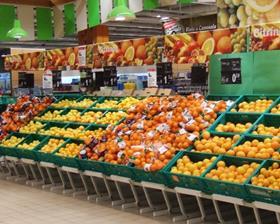
More than 97 per cent of food samples evaluated by the European Food Safety Authority (EFSA) contain pesticide residue levels that fall within legal limits, with just under 55 per cent of samples free of detectable traces of these chemicals.
That was the verdict of EFSA’s 2013 annual report on pesticide residues in food, which includes the results for almost 81,000 food samples from 27 EU Member States, Iceland and Norway.
The 29 reporting countries carry out two monitoring programmes for the report – a national programme designed by each country, and an EU-coordinated programme under which all food control authorities monitor the same basket of food products.
A combined total of 80,967 samples of a wide variety of processed and unprocessed food products were tested for the presence of 685 pesticides.
The report found that 97.4 per cent of the samples analysed fell within legal limits, 54.6 per cent were free of detectable residues, and 1.5 per cent clearly exceeded the legal limits, taking into account the measurement uncertainty, thus triggering legal or administrative sanctions against the food business operators responsible.
The report also showed that residues of more than one pesticide (multiple residues) were found in 27.3 per cent of samples.
Reacting to the study, the European Crop Protection Association (ECPA) said that the results 'confirmed once again that Europe’s food supply is among the safest in the world'.
The organisation noted that Europeans enjoyed a plentiful supply of fresh fruits and vegetables all year round thanks to modern solutions that support productive, competitive and sustainable agriculture.
“This is more good news for Europe’s consumers, farmers, retailers, agricultural advisers, authorities and the crop protection industry”, said Jean-Charles Bocquet, director general of the ECPA. “The report from EFSA confirms that food in Europe is safe. These results once again should foster consumers’ trust in the food they buy and in the whole European supply chain.”
More instances of pesticide residues exceeding the MRLs were found in food imported from countries outside the European Union (5.7 per cent) than in samples originating from the EU and EEA (1.4 per cent). The EFSA report concludes that the presence of residues found in food in 2013 was unlikely to have a long-term effect on the health of consumers.
“Year after year we welcome these results as a testament to the joint effort made by the farmers and industry in sharing and implementing best practices,' he continued. 'They demonstrate both the current high-level skill of pesticide users and the high level of food safety that we continue to see in Europe.'
“As an industry we are always working to improve on and learn from these results,' Bocquet added. 'That’s why we have set up a dedicated project on pesticide residue management that focuses on training and advisory programmes. These help reduce residues by promoting Integrated Pest Management principles and good agricultural practices in the EU and also outside of the EU – for example, in Turkey.”






No comments yet